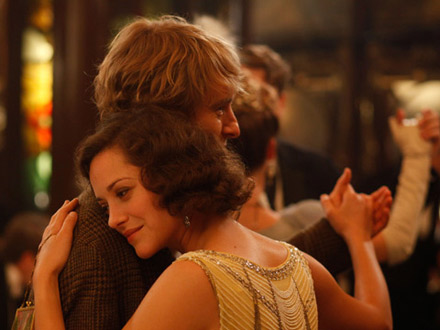I'd like everyone to know that I've moved to a new blogging site. So check out my new posts at:
Reel Voice
Reel Voice
Wednesday, August 17, 2011
Monday, July 25, 2011
"The Tree of Life" is an absorbing piece of filmmaking (4.75/5)
I’m not too sure where to begin in describing The Tree of
Life. It’s undeniably an unorthodox film that puts all of its money on
crafting impressionistic scenes over a plot driven narrative. It may feature
two of film’s most mainstream stars (Penn and Pitt) but by no means is it a
mainstream film. It sits comfortably in a world of its own, hoping an open
minded filmgoer will come along and give it a chance. With a film like The Tree
of Life and the visionary puzzle it develops into, all you can hope is that
someone can give it a chance before they label it as senseless and pretentious.
Actually, I wouldn’t be too disappointed if someone labeled it pretentious
because in many ways it is. But then again, what film isn’t seen as pretentious
when it boldly attempts to capture the essence and questions of life within the
time frame of two or so hours? It’s equivalent to trying to stuff a whale
into a sardine can, and Malick makes one hell of an effort. Notorious for being
a mad scientist behind the camera and in the editing process, Malick once again
obliterates any chance of a conventional narrative by focusing The Tree of Life
on four, maybe five, periods of time.
Monday, July 11, 2011
"Dark of the Moon" is a step up, but that's not saying much (3/5)
I often get annoyed by film watchers who try and defend a
film they covet (and that critics hate) with the simple phrase of “Geez, it’s a
movie about an over-the-top fictional subject. It wasn’t meant for the Oscars!”
With how much hate Transformers: Dark of the Moon is getting, expect to hear
that phrase quite a bit for the next few months. Let me start off with saying
that Michael Bay is a director who has a keen eye for filling a frame with
visual panache. It’s just that Bay gets distracted by a shiny object off in the
distance to the point that he loses focus on the story and characters that
emanate from within. Naturally, I expect
those who love this film to offer me a rebuttal along the lines of, “It’s not
about some amazing story! It’s about the robot on robot action!” No, everything
is undeniably about the story. The action means absolutely nothing unless a
story is present and logical within the film’s framework. Hell, if story wasn’t significant, Bay and
his team wouldn’t have even bothered with trying to craft one. Instead they
would’ve released an hour long action fest to satiate those who like to watch
big, combustible objects go up in flames.
Wednesday, June 22, 2011
"Midnight in Paris" is a whimsical delight (4.5/5)
There are times where I wonder what it’d be like to live in another time period. Sometimes it’s not just a general interest in the past, but more of a concrete period like the 40’s or 50’s.It’s no surprise that I’d feel this way because as humans we often see the past as being simpler than the time we currently reside in. I must say it’s easy to see how this happens considering that as time goes by, we often lose the context (or never gain at all) that is associated with a certain string of years or decades. Not to mention, history is almost always romanticized and fondly remembered outside the walls of a History lecture. This interest in returning to a simpler time, one that faces no uncertainties, is invariably running rampant through the mind of Gil Pender (Owen Wilson), the protagonist found in Woody Allen’s Midnight in Paris. Gil is a Hollywood screenwriter who has made his money writing big studio drivel, but at the moment he’s working on his first novel. It’s through novels that he hopes he can achieve writing legitimacy. Facing a bit of writer’s block and looking for something to reinvigorate his spirit, Gil and his fiancée, Inez (Rachel McAdams), tag along with their in-laws to Paris.
Subscribe to:
Posts (Atom)


